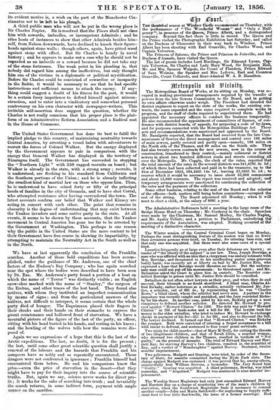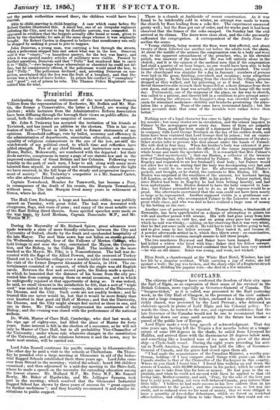Ottruiloli5 guit Viriuittr.
The Metropolitan Board of Works, at its sitting on Monday, was cc-. copied in making provisional arrangements required by the transfer of powers from the late Sewers Commission to the Board, and in getting its own affairs otherwise under weigh. The President had directed the district engineers to report on the state of the works, the existing con- tracts, the sums expended and the sums required to complete works in progress and the staff of clerks required to superintend them. He had appointed the necessary officers to conduct the business temporarily. He also recommended the appointment of committees of finance, of con- ference with district boards, of appeals, for preparing a code of by-lam4 and for purposes connected with the Metropolitan Buildings Act. These acts and recommendations were sanctioned and approve& by the Board. Mr. Bazalgette reported, that the Board had received from the late Com- missioners of Sewers the direct management and control over 166 lam of main sewers, partly covered and partly open—namely, 106 miles on the North side of the Thames, and 60 miles on the South side. They had also twenty-seven contracts for new sewers now in the course of construction, transferred to their control,—mainly collateral or district sewers in about two hundred different roads and streets extending all over the Metropolis. Mr. Coggin, the clerk of the rates, reported that the total amount of the rates in the several districts was 241,6781. 38.
of which there had been collected and paid in to the treasurer, up to the 31st of December 1855, 184,3421. 14s. is'., leaving 57,3351. 98. is'.; to recover which it would be necessary to issue about 25,000 summonses and about 15,000 warrants. The report was received and adopted; and temporary arrangements were sanctioned for continuing the collection of the rates and the payment of the collectors.
Some other business, relating to the 'seal of the Board and the salaries of the officers—both matters still being before committees--occupied the rest of the sitting. The Board adjourned till Monday ; when it will meet to elect a clerk, at the salary of 800/. a year.
The Admhaistrative Reformers held a meeting in the large room of the Bridge House Hotel on Thursday ; Mr. Corderoy in the chair. Speeches were made by the Chairman, Mr. Samuel Morley, Sir Charles Napi and Mr. Ansley Pellatt; and a petition to Parliament., embodying thsy requirements of the Association was adopted. Nothing occurred at the meeting of a distinctive character.
The Winter session of the Central Criminal Court began on Monday. Perhaps the most distinguishing feature of the session was that no fewer than seventeen persona were tried, on Tuesday, for uttering base coin and that only one was acquitted. But there were also some eases of a special ldnd.
Lunatics frequently go at large even alter their delusions are known stp. tender of "the liberty of the subject" is our law. Thus Joseph Berridge., a man who was afflicted with an idea that a clergyman was Thus, intimate with Mrs. Berridge, and threatened to do his unoffending pastor some grievous bodily harm, was recently set at liberty on bail by Mr. Justice Erie, who expressed a hope that Berridge would threaten no more. But the unfortu- nate man could not put off his monomania : he threatened again ; and Mr.. Ballsuitine asked the Court to place him, in custody. The Recorder com- mitted Berridge to prison until 31r. Justice Erie should be consulted.
Swindlers do not often select lawyers as their prey, and when they do and i
succeed, the triumph is no doubt shortlived. A. blind man Charles Al- fred Riekaby, rather notorious as a swindler, actually victimized Mr. Jus- tice, a solicitor, out of 681. 58., by representing that he was "Charles Rowe," a blind client, whom the solicitor had never seen. A partner in the imposture was recently caught and punished, and the Jury convicted Ricks- by for his share. lb another case, aided by his son Mashy got up a neat conspiracy to defraud another solicitor. He directed Mr. Howard to pro- ceed against "Howard Clinton" for 1201. The debt was paid by "Howard Clinton" in 701. of bank-notes and a bill for 501. The lawyer took the money to the elder swindler, who tried to induce Mr. Howard to exchange cheeks in payment of his fee-211. la. for 20/., and also to discount the b The lawyer declined. It turned out that " Hcrward Clinton" was Bickel:7 the younger. Both were convicted of uttering a forged acceptance to a Mll with intent to defraud, and sentenced to four years' penal servitude. Two trials for child-murder—that of Mary M`Neill, for cutting the throats of two illegitimate children' and that of Sarah Allen, a married woman, who drowned two children in the Thames resulted in verdicts of "Not guilty," on the ground of insanity. The trial of Edward Harvey and Har- riett -Ray, for starving Harvey's two children, resulted in the acquittal of Ray, and a verdict of " Manslaughter " against Harvey. Sentence, twelve months' imprisonment.
Two policemen, Madgett and Gearing, were tried, by order of the Secre- tary of State, for assaults committed during the Hyde Park riots. The charge against Madgett was sustained : it was proved that he, among others, unmercifully beat William Stevens, a bystander. The Jury found him "Guilty." Gearing was acquitted. A third policeman, Bewley, was tried yesterday, and "Acquitted." Madgett was sentenced to nine months' im- prisonment.
The Worship Street Magistrate had only just committed Edward Harvey and Harriett Ray on a charge of murdering two of the man's children by starvation, when the Southwark Magistrate finds it necessary to commit another couple—John and Maria Satchwell—for neglecting to supply suffi- cient food to four little Satchwells, the issue of a former marriage. Had
ot the pariah authorities rescued there, the children would have been mstarred.
Akin to child-starving is child-begging. A case which tame before Sir Robert Carden illustrated this. A small boy, one of an irregular regiment welting the City, sent out to beg by dissolute parents, was remanded. It appeared in evidence that the beggars actually offer bread or meat, given to them by the charitable; for sale at the same shops whence it was originally bought. Sir Robert Carden is disposed to believe that mendicancy can only be stopped by making it penal to gwe to beggars.
John Donovan, a young man was carrying a box through the streets, when a policeman stopped him Lid asked what was in the box. Donovan said it was " empty, '—a hazardous answer, for the box was heavy, and when it was opened sundry articles of millinery were visible. Pressed by further questions, Donovan said that " Polly " had employed him to carry it to "Sally,"—two beings whose whereabout or character he could not de- fine, but he considerately offered, if the policeman would mind the box, to find "Folly." The policeman declined and, arresting Donovan on sus- picion, ascertained that the box was the fruit of a burglary, and that Do- novan was a ticket-of-leave holder. In prison his conduct is "exemplary" and "good"; out of prison he robs. The Thames Police Magistrate com- mitted him for trial.



























 Previous page
Previous page